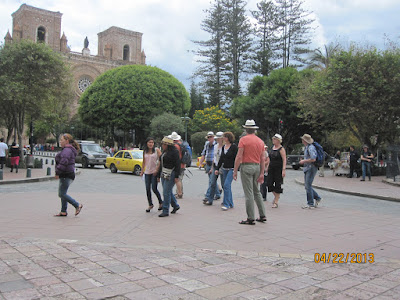 |
| Bike, walking, jogging trail Panama City, Panama |
In many respects Ecuador is more livable (not better) according to our needs and circumstances; however, someone else might find Panama to be just what they need according to their circumstances. Everyone has their own needs and circumstances that consequently will require different degrees and standards of living conditions, which cannot be found in any one-paradise that happens to be pumped that month! That’s why taking someone else’s opinions as fact, no matter how popular that travel magazine might be, is a really bad idea.
The word “better” is often thrown around loosely with people who like to compare countries but perhaps they aren’t thinking about “better for whom”? You’ll read on forums where users often say one country is better than another but according to whom? So, just remember that when you get all excited reading about a country being better than another, whether it’s on a forum or in an online travel magazine that they are talking about their own personal subjective opinion, not fact.
 |
| La Carolina Parque, Quito Ecuador |
If you are serious about putting down roots in a city abroad, go visit first and do NOT believe all the hustlers. As you know, one of the BIG issues we have with travel abroad media is they pipe everyone into the same category. For instance, just because a writer thinks the weather in Ecuador or Portugal is great, they also think it must be great for everyone else too, which clearly is not so.
I absolutely love the tropical weather of Panama. Sure it gets hot there, but I like tropical climates way more than the Andes climate, but that’s just me; it’s my personal opinion. Someone else might not be able to bear under the Equatorial heat and humidity of Panama. So then how can anyone say where the best place to retire is? See?
So, with all of that out of the way, here is some of our opinions, experiences and observations about Panama compared with living in Ecuador.
There are many nice towns, outside of Panama City that one could surely set up roots and live a comfortable lifestyle on less, just about the same as in Cuenca. But living for less usually means going without the standards of living that most folks have become accustomed to in the U.S or Europe.
 |
| David, Panama |
We’ve said from the beginning and will continue to say, “Don’t move somewhere just because it’s cheap”. It’s not a good enough reason to uproot your whole life and lifestyle that you are so accustom to because in most instances, if you go move somewhere just because it’s cheap, you’ll end up NOT liking it too much.
Travel somewhere because you want the adventure” or “move somewhere because you already have roots there” or “you already did the research”, but to simply pick up and move just because you’re being told it’s cheaper than where you are now is not a suitable enough reason for drastically changing your lifestyle. The important thing to remember is, what’s in it for the pumper? There are many real estate pumpers and seminar pumpers on the internet.
 |
| Cuenca Ecuador - Turi view |
Do you know how taxing and time-consuming it is just to move your household and family from one neighborhood to another in the same city you live in is? It’s very stressful and takes adjustments just being in a new area of the city you already live in. Imagine moving clear across the world in a new continent with a totally different way of life!! Now that’s something to think about.
And remember, a two or three month vacation, living as a tourist is much different than actually residing somewhere and being a resident abroad.
 |
| Puerto Armuelles, Panama |
There are writers that will tell you what they like about Ecuador and there are writers that will tell you what they like about Panama and that’s great! Take it all in and absorb it all into your mental system, but in the end, you are the one who will need to experience it all for yourself anyway.
One person’s paradise is Panama, another person’s paradise is Ecuador and another person’s paradise is…staying exactly where they are. We will continue to give you the facts as we experience them, without the gloss and pump.
Until we write again, have a great adventure wherever you decide to move to abroad!
If you liked this article, we think you'll also like these.
- The Fallacy of Real Estate Purchasing Power and the Fickleness of Cheap Edens
- The Minimalists Guide to Living Well on Less Abroad
We're an Expat Family of Five, Living Frugal, Healthy and Happy Abroad. We live in Cuenca, Ecuador and travel the Ecuador coast whenever we get a chance. We just adventured throughout the country of Panama for five weeks! Come along and enjoy some of our experiences with us!










